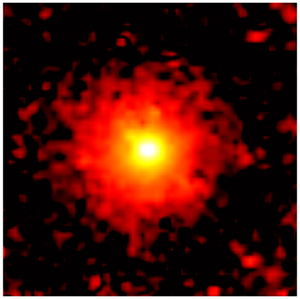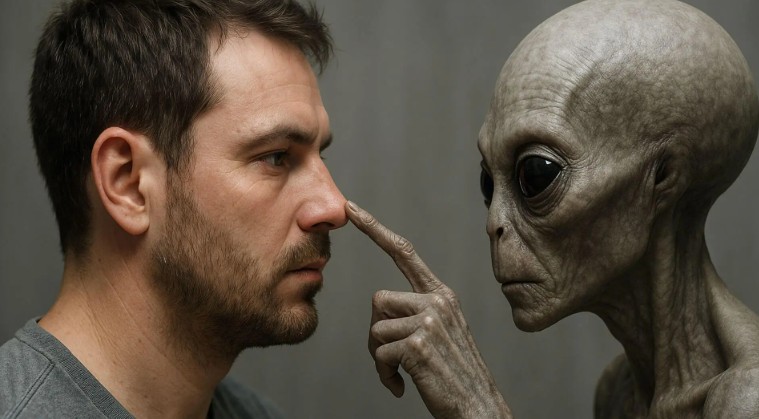


On a hike to a magnificent mountain top near Schloss Elmau in Germany, the brilliant Dr. Rolf Dobelli, founder of WORLD.MINDS, asked me what future event might endow humans with a deeper meaning for their existence?
I suggested that an encounter with alien intelligence could deliver this gift in the broader context of our cosmic family. Finding extraterrestrial siblings would inspire us to reach out beyond the limited experiences we had so far on our home planet. There are richer opportunities in our cosmic street than available at home. For example, those worried about the cold death of the Universe would find solace in the opportunity to join a camping site of intelligent beings around an artificial source of heat. This would allow humanity to survive the future cosmic winter for potentially more than ten trillion years, the longest lifespan of stars. The Drake equation is framed in the context of stars as natural nuclear furnaces, ignoring the possibility of technologically produced ones.
Rolf asked: “And why should we expect aliens to be kind to us and not have the gangster mentality?” I explained that gangsters often have a short life because they engage in conflicts and play Russian roulette under risky circumstances. Any interstellar visitors to our back yard must have survived under duress for billions of years. They might abide by the principle of “survival of the kindest.”
I confessed to Rolf that I am an optimist for a practical reason. Lonely people do not engage in blind dates if they believe that their dating partners are likely to be serial killers. They are motivated to seek partners if they believe that kindness is abundant on the dating scene.
An hour before the hike, I spoke over zoom with members of the House of Representatives in Japan (accessible here) who asked for my perspective on the possibility that anomalous interstellar objects, like IM1, 1I/`Oumuamua and 3I/ATLAS or Unidentified Anomalous Phenomena (UAP) in the Earth’s atmosphere, may represent alien technology. The participants included Rep. Yasukazu Hamada (Former Minister of Defense), Rep. Shu Watanabe (Former Vice Minister of Defense), Rep. Atsushi Suzuki (Chairman of the House of Representatives Committee), former Rep. Yoshiharu Asakawa and Professor Naotaka Naganawa, a particle physicist from Nagoya University.
I explained that new scientific knowledge is acquired by attending to anomalies. I described the five anomalies of 3I/ATLAS and the need for better data to give it a reliable rank on the Loeb Scale. I also described the three observatories constructed by the Galileo Project aiming to gather scientific-quality data on UAP.
The attendees told me that they find my research inspiring and asked how fledgling scientists in Japan can get involved in the Galileo Project. In response, I mentioned that my Galileo postdoc, Dr. Laura Domine, is starting a faculty position in Japan next month and will be glad to mentor students on research related to the Galileo Project.
The search for cosmic siblings is an uphill challenge, just like the hike to the inspiring mountain top. I arrived at Schloss Elmau, the designated German site for the G7 summit of heads of state held in 2015 and 2022, as a speaker in a summit hosting a select group of high-level CEOs and politicians, organized by the Stern-Stewart Institute. The talks over the past three days included two types of content: one complaining about the geopolitical reality on Earth, and the second inspiring the audience with advances in science and technology.
My presentation of the second type reviewed the latest Galileo Observatory in Nevada, to be completed next week with three units that would triangulate distances, velocities and accelerations of objects in the sky — to check whether they lie within the performance envelope of human-made technologies. I also discussed my research on 3I/ATLAS, including the question of whether it exhibits non-gravitational acceleration. A few minutes before my presentation, I received an email from a fan which stated:
“Dear Professor Loeb:
There are some news articles and commentators who suggest that 3I/ATLAS is just an ordinary comet. If I ask AI to give me the probability of 3I/ATLAS being alien technology, it answers: 10–20%. But if I ask AI to only consider the observational data, it calculates a very high probability using aBayesian formula. I think it’s because the scientific community has a conservative tendency, whereas AI is neutral.”
After my presentation, Dr. Xiaodi Hou, the visionary CEO of BotAuto who pioneered driverless trucks, approached me wearing a T-shirt featuring 3I/ATLAS and asked me to autograph it. He promised not to place this T-shirt in a washer ever again.
Dr. Will Marshal, CEO of Planet Labs, asked me why we are on the verge of encountering super-human intelligence by developing Artificial General Intelligence as well as by searching for alien intelligence during the same century. I suggested that it is the virtue of humans becoming more intelligent, able to create machines which exceed their cognitive abilities while also becoming aware of their larger cosmic neighborhood. Both experiences will deliver a sense of modesty, which we desperately need after the German philosopher Friedrich Nietzsche declared in 1882: “God is dead.”
At dinner, Sir Martin Sorrell, founder of WPP plc, told me that when he visited the Theresienstadt Concentration camp, he was struck by two types of drawings made by children who stayed there during the holocaust: one showing their grim reality of barbed wires and the second illustrating hope for a better world. Those among us who dream — like these kids — of a better world than Earth, might guide us to the promised land. During our future encounter with aliens, we might acquire a grander meaning to our life.
∞
is the head of the Galileo Project, founding director of Harvard University’s — Black Hole Initiative, director of the Institute for Theory and Computation at the Harvard-Smithsonian Center for Astrophysics, and the former chair of the astronomy department at Harvard University (2011–2020). He is a former member of the President’s Council of Advisors on Science and Technology and a former chair of the Board on Physics and Astronomy of the National Academies. He is the bestselling author of “Extraterrestrial: The First Sign of Intelligent Life Beyond Earth” and a co-author of the textbook “Life in the Cosmos”, both published in 2021. The paperback edition of his new book, titled “Interstellar”, was published in August 2024.

